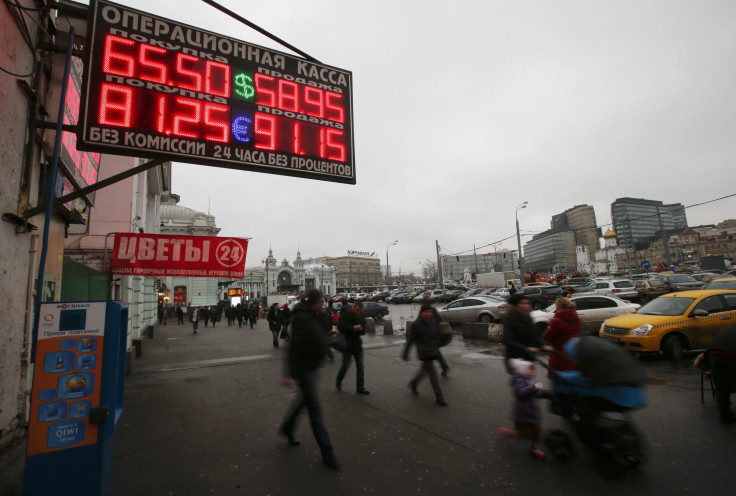Ruble Crisis Could Force Russia To Spend Another $70B Amid Economic Turmoil

The Bank of Russia could spend almost a sixth of its $416 billion reserves to boost ruble and the country’s stricken economy after its desperate move to increase the key interest rate failed to halt the currency’s worst downfall since 1998, according to a survey of economists, conducted by Bloomberg.
The ruble crisis could lead to unlimited purchase or sale of the currency on the exchange market, forcing the central bank to deploy another $70 billion to fight the turmoil, the survey of 18 economists estimated, adding that Russia’s next probable actions could include additional rate hikes and measures to regulate flows from capital markets, Bloomberg reported.
“The full-blown crisis of confidence requires nothing less than aggressive, committed FX intervention,” Phoenix Kalen, an economic analyst at London-based Societe Generale SA, told Bloomberg. “With that said, the window of time for which direct intervention would be effective in staunching the ruble bloodbath is quickly running out, beyond which the next set of measures to be contemplated would likely be capital controls.”
Russia has reportedly spent about $80 billion -- a fifth of its international reserves -- in an unsuccessful move to stabilize the ruble, which is now trading at 69.66 to the dollar. The currency breached the 64.00 level for the first time on Monday.
In an attempt to prop up the ruble, Russia's central bank decided to increase its key interest rate to 17 percent, up from 10.5 percent, with effect from Tuesday. But the move witnessed only a brief rally in the currency.
On Tuesday morning, the ruble was down over 11 percent against the dollar at 73.00 after dipping past 74 against the dollar for the first time, Reuters reported, adding that the ruble has fallen 20 percent since the start of the week and more than 50 percent this year.
Ruble’s collapse, driven by falling oil prices and Western sanctions imposed on Russia over the conflict in eastern Ukraine, could further weaken President Vladimir Putin’s grip on power. His popularity is heavily relied on Russia’s petroleum revenues that have helped increase the country’s income during his 15-year tenure.
“Putin rode the wave of higher oil prices in the years after he came to power, but there is no question that the economics will start to adversely impact the politics,” Nicholas Spiro, managing director of Spiro Sovereign Strategy in London, told Reuters. “The pieces are falling into place to start to affect the political sustainability of this regime.”
Meanwhile, the White House said Tuesday that U.S. president Barack Obama is expected to sign a bill imposing new sanctions against Russia's defense and energy industries.
The bill, which was passed with overwhelming support in Congress, also gave Obama the authority to provide both lethal and non-lethal military aid to Ukraine, BBC news reported.
“These sanctions could be lifted in a matter of weeks or days, depending on the choices that President Putin takes,” U.S. Secretary of State John Kerry said Tuesday, adding that the new sanctions were not introduced to “hurt the people of Russia.”
© Copyright IBTimes 2024. All rights reserved.




















